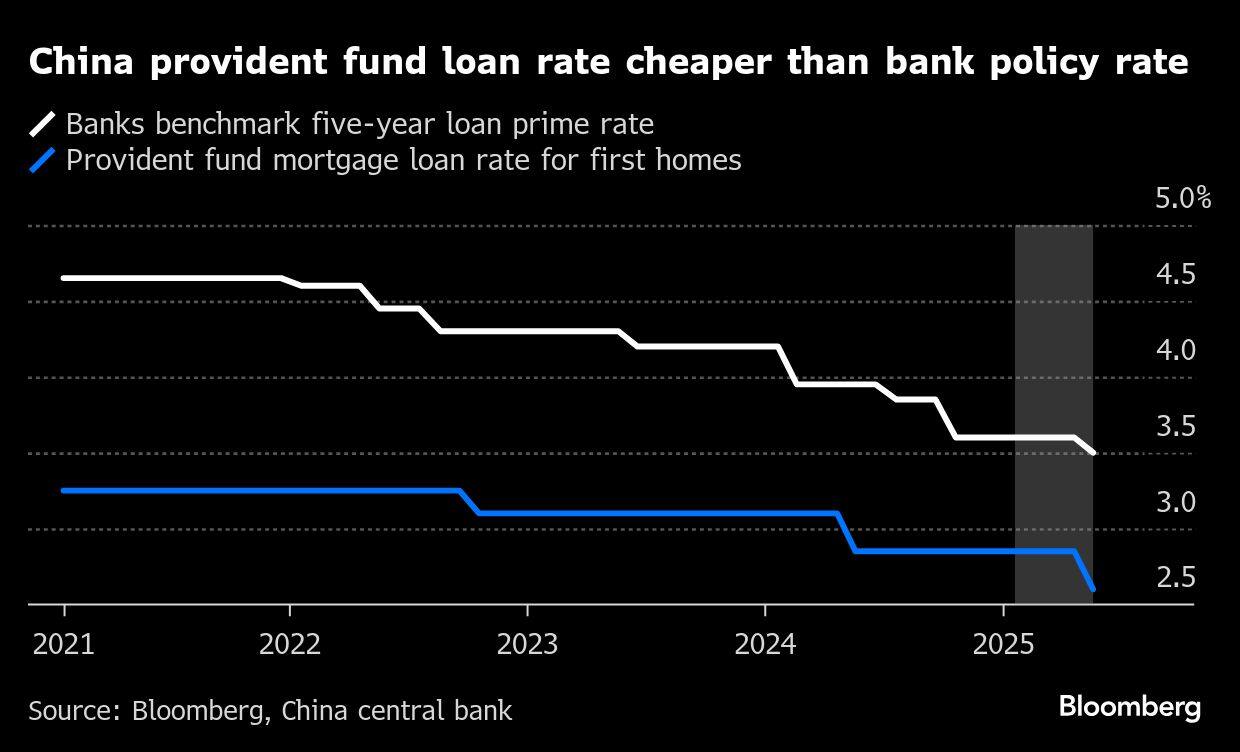



China is tapping an often-overlooked pool of funds worth 10.9 trillion yuan ($1.5 trillion) to salvage its housing sector, offering people an alternative to bank mortgages.
The housing provident fund, a government savings program used to help people buy homes, has become an increasingly important means to obtain financing, as banks turn more cautious with profit challenges. The fund has outpaced banks in giving out loans, hitting 8.1 trillion yuan in outstanding mortgages last year.
“It’s a frontrunner among policies used to support the housing market,” said Chen Wenjing, a research director at China Index Holdings Ltd. “The housing market has seen lingering pressure, and many local governments have leveraged this policy to reduce the mortgage burden.”
The program, which China adopted from Singapore three decades ago, requires employees and employers to contribute monthly into a pool that can then give out mortgages, often at a lower interest rate than banks.
President Xi Jinping has pledged to help the country turn around the ailing property market and counter external shocks, a challenge that was brought back in focus this month after the US and China accused each other of violating a trade truce agreed in May.

The provident fund’s importance is growing at a time when banks, which have been enlisted to support the economy over the past few years, are battling record-low margins, slowing profit growth and rising bad debt.
Easing financing for mortgages is important as China’s housing market recovery remains tenuous. China’s top 100 developers are expected to see contracted sales decline at least 10% this year to about 3.4 trillion yuan, less than a third of 2020’s peak, according to Bloomberg Intelligence analyst Kristy Hung.
Residential sales continued to fall in May. Distressed giant Country Garden Holdings Co.’s 28% slide in sales last month underscored buyer concerns about the firm’s health and the broader sector.
When buying homes, China’s middle class usually take out a combined mortgage — a bigger chunk from a bank with higher interest rates, and a smaller and cheaper loan from the provident fund.
The amount of loans a person can tap from the provident fund is usually limited — it’s determined by a variety of factors including how much they have deposited in the pool and their marital status. Most places also restricted people from making downpayments with the money.
Since last year, many cities began easing rules. This year, at least 50 municipalities and cities relaxed the conditions on how people can use loans provided by the provident fund, including increasing the amount they can take out, according to China Index Holdings.
Shenzhen, China’s least affordable city, this week allowed residents to withdraw their deposits in the scheme to fund downpayments. The latest relaxation followed significant easing in March, which included nearly doubling the mortgage loan quota from the level in 2023.
Usage of the fund has been growing. In the capital of Beijing, it financed 33% of residential mortgages last year, up from 29.4% in 2020.
Cheaper Mortgages
The central bank recently cut interest rates for mortgage loans given out by the housing provident fund, making it 0.9 percentage points cheaper than bank mortgages.
While the rate cut reduces borrowing costs for a homebuyer by about 3%, the relief is “rather marginal” and unlikely to cause a rally in home sales, said Liu Jieqi, a Hong Kong-based property analyst at UOB Kay Hian.
“It signals the government’s efforts,” Liu said. “But in the end, a broad property recovery hinges on effective implementation” of policies and a better economic outlook.
For now, the provident fund is helping to plug a gap as lenders cut back. Outstanding home loans by the fund grew 3.4% in 2024, while commercial bank loans dipped 1.3%.
 China provident fund loan rate cheaper than bank policy rate
China provident fund loan rate cheaper than bank policy rate
Unlike banks, the provident fund has ample ammunition for more aggressive lending. With contributions from almost 180 million employers and employees across the country, the fund had an outstanding 10.9 trillion yuan as of 2024, higher than the outstanding amount of its mortgage loans, according to official data.
Computer science researcher Eli Zhang is a typical young buyer benefiting from the fund. The 30-year-old snapped up a 700 square foot (65 square meter) home in suburban Beijing in 2023. Since then, Zhang has been tapping the provident fund every month to partially cover her $550,000 mortgage.
“The housing provident loans are getting cheaper and cheaper,” said Zhang, who now pays interest of about 2.85% for mortgages from the provident fund. “With its help, my mortgage is quite affordable.”
Discover the latest Business News, Sensex, and Nifty updates. Obtain Personal Finance insights, tax queries, and expert opinions on Moneycontrol or download the Moneycontrol App to stay updated!
Find the best of Al News in one place, specially curated for you every weekend.
Stay on top of the latest tech trends and biggest startup news.